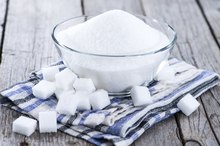What Causes the Liver to Make Too Much Cholesterol?
Cholesterol plays a vital role in cell membranes, movement of fat through the blood and the synthesis of certain hormones. Because cholesterol is such an important molecule, the human liver synthesizes cholesterol and distributes it throughout the body via the bloodstream. But genetics and dietary factors can disrupt the normal mechanisms that control cholesterol production and release in the liver, possibly leading to potentially damaging levels of cholesterol in the blood.
Genetics
Genetics play a major role in high cholesterol. While most cases of high cholesterol involve a number of currently unknown genetic factors in complex interaction with diet, there are some relatively rare types of high cholesterol caused by single-gene variations that illustrate how important the genetic contribution can be. Several single-gene defects in the cholesterol regulation mechanism have been identified. Each of them results in some degree of high cholesterol that begins early in childhood. The most severe disorders, such as familial hypercholesterolemia, cause deposits of cholesterol to form immediately underneath the skin and lead to death from heart disease by age 20 or 30. While these disorders are rare, they point out the dramatic effect genetic variation can have upon cholesterol regulation. Milder and more common cases of high cholesterol are undoubtedly at least partially caused by subtler combinations of gene variations that have yet to be determined.
- Genetics play a major role in high cholesterol.
- While these disorders are rare, they point out the dramatic effect genetic variation can have upon cholesterol regulation.
Dietary Fat
A High Number of Leukocytes
Learn More
One of the main functions of cholesterol is to aid in the transport of fat through the blood. The liver packages fat molecules with cholesterol into particles called lipoproteins that are released into the blood. Lipoprotein particles have different densities, and high levels of low destiny lipoprotein, or LDL, are associated with increased coronary artery and other vascular disease. Certain types of dietary fat are know to increase levels of LDL. Trans fat, a man-made product found in some processed food, is particularly noted for causing unfavorable changes in cholesterol. Saturated fats, which are found in coconuts and animal products such as meat and whole milk, are also known to increase LDL, although their exact role promoting vascular disease is controversial.
- One of the main functions of cholesterol is to aid in the transport of fat through the blood.
- Saturated fats, which are found in coconuts and animal products such as meat and whole milk, are also known to increase LDL, although their exact role promoting vascular disease is controversial.
Fructose
Fructose is a type of simple sugar that is found in small quantities in fruits and in much larger quantities in concentrated sweeteners such as honey, high-fructose corn syrup and sucrose, or table sugar. Unlike the other simple sugars, glucose and lactose, fructose can only be metabolized by the liver. While small amounts of fructose, such as would be found in typical servings of whole fruits, can be used to supply the liver's energy needs, large doses, which can result from consuming large amounts of soda or other products containing concentrated sweeteners, have been shown to cause the liver to synthesize a particularly dangerous type of cholesterol know as very low density lipoprotein, or VLDL. For example, an article in the June 2009 issue of the "American Journal of Clinical Nutrition" found that large doses of fructose increased VLDL levels 51 percent in normal individuals and 110 percent in those with a family history of diabetes 2.
- Fructose is a type of simple sugar that is found in small quantities in fruits and in much larger quantities in concentrated sweeteners such as honey, high-fructose corn syrup and sucrose, or table sugar.
- While small amounts of fructose, such as would be found in typical servings of whole fruits, can be used to supply the liver's energy needs, large doses, which can result from consuming large amounts of soda or other products containing concentrated sweeteners, have been shown to cause the liver to synthesize a particularly dangerous type of cholesterol know as very low density lipoprotein, or VLDL.
Related Articles
References
- "Harrison’s Principles of Internal Medicine 16th ed."; Dennis L. Kasper, et al. (eds.); 2005
- "American Journal of Clinical Nutrition"; "Fructose overconsumption causes dyslipidemia and ectopic lipid deposition in healthy subjects with and without a family history of type 2 diabetes"; KA Le; June 2009
- American Heart Association. What is cholesterol?
- Cleveland Clinic. Cholesterol: What you need to know about high blood cholesterol. May 1, 2019.
- National Center for Health Statistics. Total and high-density lipoprotein cholesterol in adults: United States, 2015–2016. October 2017.
- Centers for Disease Control and Prevention. Cholesterol.
- Barter PJ. The causes and consequences of low levels of high density lipoproteins in patients with diabetes. Diabetes Metab J. 2011;35(2):101-106. doi:10.4093/dmj.2011.35.2.101
- American Heart Association. How to get your cholesterol tested.
- Keene D, Price C, Shun-shin MJ, Francis DP. Effect on cardiovascular risk of high density lipoprotein targeted drug treatments niacin, fibrates, and CETP inhibitors: meta-analysis of randomised controlled trials including 117,411 patients. BMJ. 2014;349:g4379. doi:10.1136/bmj.g4379
- Tall HR, Rader DJ. Trials and tribulations of CETP inhibitors. Circulation Research. Oct. 10, 2017.
- U.S. Food and Drug Administration. Cholesterol: Medicines to help you.
Writer Bio
Sydney Hornby specializes in metabolic disease and reproductive endocrinology. He is a graduate of Claremont McKenna College and Drexel University College of Medicine in Philadelphia, where he earned his M.D., and has worked for several years in academic medical research. Writing for publication since 1995, Hornby has had articles featured in "Medical Care," "Preventive Medicine" and "Medical Decision Making."









